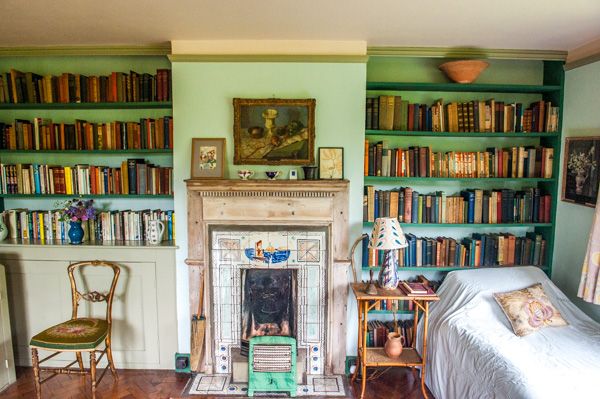I used to work for a boss who told me that she could put me in the middle of a minefield and it wouldn’t keep me from doing my job. But not everyone is as insensitive to their surroundings as I used to be. In fact, I’ve become quite sensitive to them. Right now, there’s a thunderstorm brewing outside my window and though it’s still daytime, it looks like night out there. I can hear the rataplan of raindrops being beaten against my window by the same high winds that just toppled my rose arbor. It’s the perfect climate for killing someone on the page. And since my surroundings are cozy, I’ll be carrying out that activity in a manner consistent with cozy mysteries (no graphic sex or violence).
But what if I were in a different setting? If I were sitting in room piled high with Victoriana, might I be writing about dropping arsenic in a teacup? Would a beach house with an ocean view inspire me to introduce a man-eating shark into my story? Would some dark and dank corner of a concrete jungle entice me to stick a hypodermic needle in someone’s arm?
In other words, does where we write influence what we write?

According to an article on TheAtlantic.com, it took F. Scott Fitzgerald nearly a decade to finish Tender Is the Night, in part because his peripatetic lifestyle kept him bouncing around continents. When he finally settled in one place, he wrote in “dark, disheveled rooms with a bottle of gin in a nearby drawer.” That could easily explain why his novel is so bleak. The Wikipedia article about it claims the bleakness reflects the darkest years of the author’s life. But it could also be argued that it reflects the darkness of his surroundings as well.
The article on TheAtlantic.com cites various papers and studies that examine the effects of one’s surroundings on one’s creativity. Here’s a quick recap of the elements that can stimulate your creativity:
- Darkness
- Plentiful noise
- Plentiful booze
- Dim lighting
- A messy desk
- No desk
- Disorder
- Ambient noise similar to what you’d hear at your local Starbucks
- Rooms with high ceilings
The article also suggests that writing by hand, taking a walk, and getting a little drunk can promote abstract thinking, which is so critical to creativity, especially if your starting point is “What if?”
Of course, your environment can’t make you creative if you’re not creative in the first place—all it can do is inspire and enhance. As Fitzgerald wrote, “You’ve got to sell your heart, your strongest reactions, not the little minor things that only touch you lightly, the little experiences that you might tell at dinner.”
So I vote yes, where we write influences what we write. But you be the judge. Check out this amusing compilation of famous authors’ bedrooms and decide which decorative style inspires you most:

Thanks this week go to the wonderful folks who run the Writers’ Studio at Bainbridge Artisan Resource Network (BARN). It’s always a pleasure to pop in for a workshop, panel discussion, or writer’s salon. And it’s the folks at BARN who first introduced me to the floor plans of famous writers’ bedrooms. Hope you enjoy looking at them as much as I did!
Sounds like you may wish to hit the bottle every now and then.